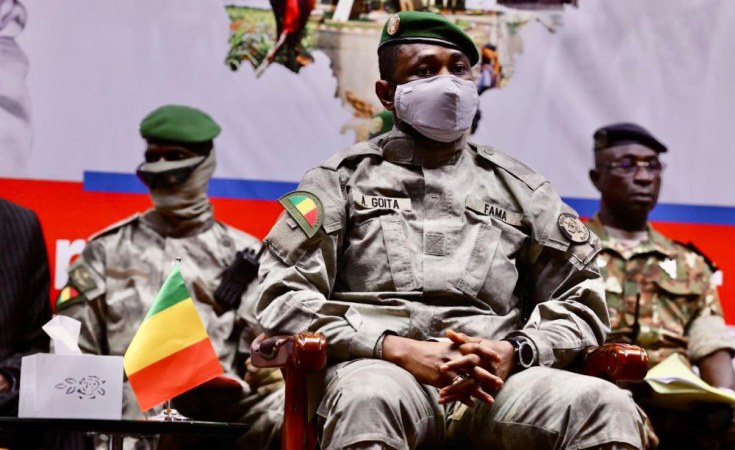Geneva — With no political solution in sight, the United Nations refugee agency warns that Niger's political crisis could rapidly deteriorate into a humanitarian crisis as attacks by non-state armed groups continue and sanctions imposed by the Economic Community of West African States on the country begin to bite.
Since a military coup ousted Niger's democratically elected president on July 26, "there has been a crisis of uncertainty," said Emmanuel Gignac, the representative for the United Nations High Commissioner for Refugees in Niger.
"It is difficult to see what will happen," but given the unsettled situation, he said, "the UNHCR and U.N. agencies are developing contingency plans to be prepared for whatever emergency may arise."
Gignac said violence and attacks by armed groups, especially near the Mali and Burkina Faso borders, have displaced more than 20,000 people in the last month.
During the same period, he noted that up to 2,500 refugees, mainly from Mali and Burkina Faso and some from Nigeria, have fled into Niger -- a situation that "has heightened protection risks for refugees, asylum-seekers, and their hosts."
Currently, said the UNHCR, Niger is hosting 700,000 forcibly displaced people; half are refugees and asylum seekers and the other half are internally displaced people.
On a visit to Geneva from his post in Niamey, Gignac told journalists Tuesday that Niger's status as a hub for refugees was in jeopardy.
"It is also a route, a migration route towards North Africa and Libya in particular," he said. "And we do have asylum seekers and people in need of international protection who are mixed with these movements."
Because the borders are closed, he said, it was not clear whether these flows would continue.
"If they do," he said, "they will have to happen in a way that is far more underground than what they used to be. So, this may also lead to more exploitation and abuses."
Additionally, Gignac noted that since the UNHCR established the Emergency Transit Mechanism (ETM) in 2017, Niger also has offered protection to more than 4,242 vulnerable asylum-seekers and refugees evacuated from Libya.
"Prior to the July 26 coup, an ETM flight from Libya was planned for the fourth quarter," he said. "UNHCR is awaiting approval from authorities for the transfer and will keep monitoring conditions to determine the feasibility of bringing new ETM refugees into the country."
Concern about sanctions, military intervention
Gignac said the threat of military intervention by ECOWAS, though seemingly unlikely, hung in the air and must be taken seriously. He said he was particularly concerned by the sanctions imposed by ECOWAS, which made no exceptions for humanitarian relief.
He called for the sanctions to be lifted, warning that the inability to bring sufficient humanitarian aid into the country would have a catastrophic effect.
"The fact that people do not have access to, as they used to have, to food commodities and the scarcity of goods in general will lead to a number of protection risks that will develop," he said. "We are talking about early marriage, sexual violence, trafficking and exploitation."
He said the sanctions already were creating difficulties as they kicked in during Niger's so-called "hunger period"--the time before the next harvest when food stocks are at their lowest.
"These factors, with an expected increase in agitation by non-state armed groups, as well as ongoing heavy rains, have worsened the already dire humanitarian outlook for vulnerable populations," he said.
Gignac said the two main non-state actors in Niger were Islamic State militants who operate on the Mali side of the border, and an al-Qaida affiliated group based on a riverbank near Burkina Faso. He added that criminal gangs in the Mali region "enacted similar damage and acts of violence."
Violence increases since coup
The UNHCR, which has a well-developed monitoring system that tracks incidents of abuse, found there to be 255 incidents in July including kidnapping, gender-based violence and domestic violence. The agency blames the incidents on militants and criminal gangs.
"These data are in line with other months of 2023," said Gignac. "UNHCR teams have witnessed a sharp increase in such incidents since July 26" noting that "between July 26 and July 31, we observed a 50 percent increase in similar incidents from the earlier weeks in July."
For now, Gignac said there have been no reports of large movements of people fleeing from Niger to neighboring countries. But given the political crisis, related uncertainties, and the potential for increased inter-communal violence, he said, this could change.
"If there was a military intervention, we know that Nigeria would play a key role in the force," he said, adding that Nigerians comprised nearly two-thirds of the 350,000 refugees and asylum seekers in Niger.
"How would the host community react?" he asked. "On the one hand, generously hosting refugees from Nigeria and on the other hand being a kind of attacker, you know?"


